
Surah Ash-Shams is a Meccan Surah with fifteen verses. Shams means The Sun. The Surah has been so designated after the word ash-shams with which it opens.
This Surah was revealed in the earliest period at Makkah at a stage when opposition to the Prophet pbuh had grown very strong and intense.
Its theme is to distinguish the good from the evil and to warn the people, who were refusing to understand this distinction and insisting on following the evil way, of the evil end.
Main points stressed in the Surah are:
➖The effects of good and evil are contradictory and so are the results just as the Surah explains the seven oaths in the start, creations in opposition according to their nature.
➖Allah has already made man aware of the inbuilt guidnace and the Divine guidance through revelation, so man is not uninformed in this system.
➖If man develops the good inclination and frees his self of the evil inclinations, he will attain to eternal success, and if he promotes the evil, he will be the failure.
➖While narrating this story of the people of Thamud nowhere in the Surah has it been said “O people of Quraish, if you rejected your Messenger pbuh, as the Thamud had rejected theirs, you too would meet with the same fate as they met.” The conditions at that time in Makkah were similar to those that had been created by the wicked among the people of Thamud against the Prophet Salih a.s. Therefore, the narration of this story in those conditions was by itself enough to suggest to the people of Makkah how precisely this historical precedent applied to them.
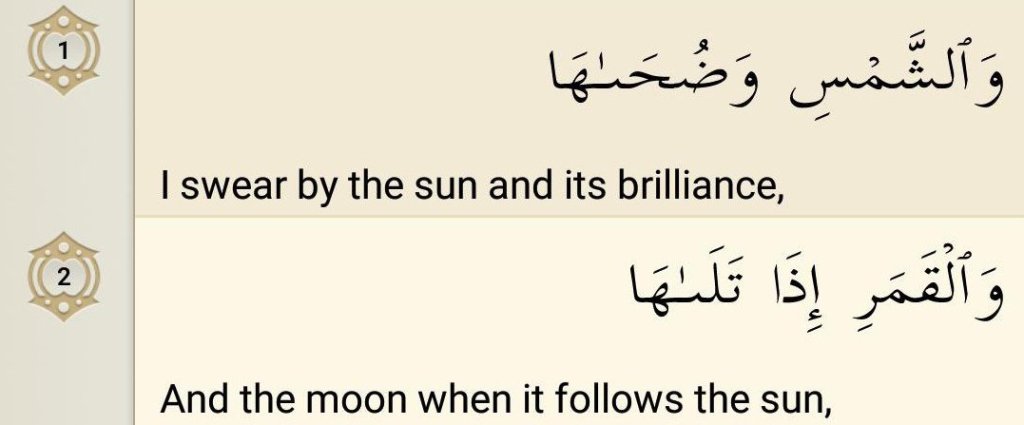
There are some considerable oaths pointed out at the beginning of this Surah, which are seven in number. This is the largest number of oaths taken throughout the Quran and this shows that in these verses the solemn appeal is made to something very splendid. The matter is as important as the solemnity of the heavens, Earth, sun, and moon; that which is effective in the fate of Man.
First, the oaths will be described and commented on and then, attention will be paid to the great subject that these oaths are made to.
“By the Sun and its brightness”
Quranic oaths are generally for two purposes. First, the oaths pertain to the importance of the subject which the oath is made to. Second, they pertain to the importance of the affairs themselves, since oaths are always made to great matters. In this way, the oaths make Man contemplate and evoke his thoughts to work on the great objects of Allah’s sublime creation through which he may find a path to Him.
The sun plays a most important role in Man’s life and in the life of all living creatures on the earth, because it is not only a source of heat and energy; the essential factors necessary for life, but also it is the origin of some other life giving factors such as; winds, rains, plants, running rivers and waterfalls, and even the energy mineral sources; oil, coal, and the like, all depend on the sunlight so that if this world- illuminating-lamp ceased one day, darkness, silence and death would dominate everywhere.
The term duha originally means ‘those hours of the morning which follow shortly after sunrise’, and here it means ‘the full brightness of the sun’.
The particular emphasis put on the term duha is for its importance, when the glory of sunlight dominates the land, and its effect is soothing.
“By the Moon when it follows it”
The word talaa means to follow right behind something. In this ayah the moon is not given a unique entity, rather it is given a subservient quality. Allah swears by the moon as it follows the sun. When the moon becomes full it reflects light off the sun and draws light from it and hence is in a subservient position. So Allah swears by the moon when it follows the sun means reflects the sun’s light.
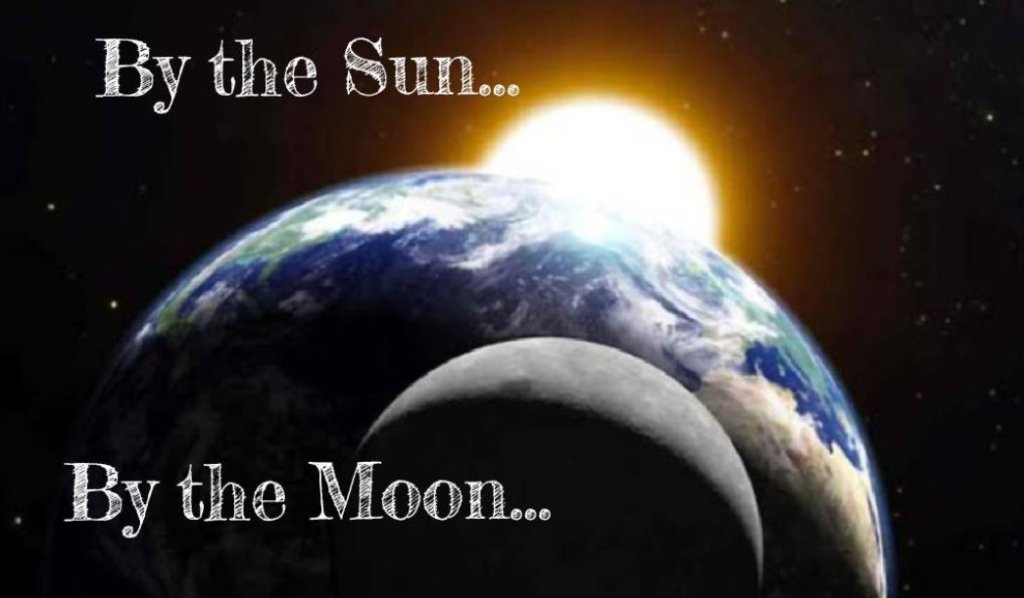
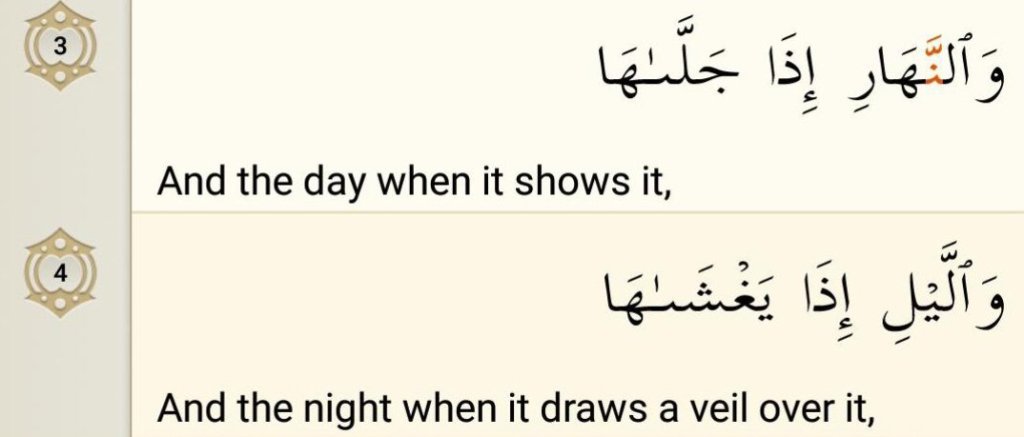
By the day as it displays its (the sun’s) glory
Allah then takes oath in the day as it is displayed. The word jalla is to give brilliance to something, where you give something that is already bright exposure. For example, the lamp that is covered up can only be appreciated when it is exposed. The sun is what causes the day to appear but here Allah is saying that it is in fact the day that gives the sun the opportunity to show and display its full glory. Allah creates opportunities every day for the brilliant sun to be appreciated.
And by the night as it conceals it (the sun)
Here Allah takes oath in the night as it covers the sun. The oaths in this surah thus far have centred around the sun and with this ayah Allah takes another oath referring to the sun (the ‘ha’ refers to the sun). The sun, whose light is covered up by the night. A parallel will soon be drawn in this surah between the sun and the nafs, which is commonly translated as soul or one’s conscience.
When the night comes, the sun hides and its light remains hidden throughout the night. This state has been described, saying that the night covers up the sun, for the night actually signifies the sun’s hiding behind the horizon because of which its light cannot reach that part of the earth where the night has fallen.

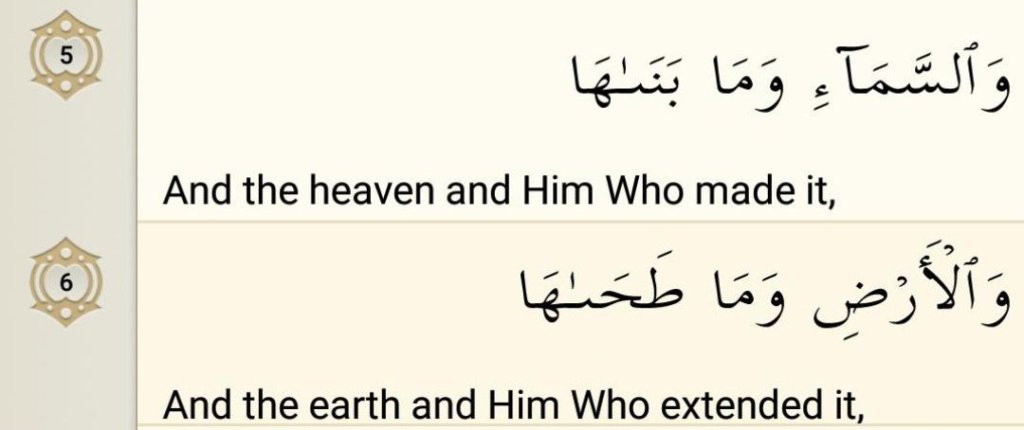
“By the heaven and He Who made it”
The creation of the glorious heaven with its beautiful heavenly bodies and their wonderful regularities, is one of the manifestations of Allah’s might and wisdom which none else, besides Him, could ever produce. It is encouraged to think in amazement what kind of power can possibly create it. Man is being asked to look up at the sky and exhaust his imagination by thinking about what kind of power Allah must be.
The word binaa in Arabic is to put something together in such a way that it gets fused together and becomes inseparable and this is actually an illustration of the flawless sky in which there are no cracks or gaps. There is nothing in the sky that needs fixing. Rather it is all covered up for our safety and protection.
(And) who created seven heavens in layers. You do not see in the creation of the Most Merciful any inconsistency. So return (your) vision (to the sky); do you see any breaks?
(Al Mulk V: 3)
“By the Earth and He Who spread it”
The Earth, which is a cradle of life for Man and all living creatures, with all its wonders; mountains, seas, valleys, forests, springs, rivers, mines, and other precious sources, is a collection of the Divine Signs, each of which if studied intelligently, is an evidence of His might and wisdom, and more important than the Earth is the Creator of the Earth Who spreads it out. The word taha means to spread out and to lay down. This word is used only once in the Quran.
The function of these oaths is to invite us to reflect on these illustrations that Allah has given, e.g. the sun, the moon and the night, in preparation for the rest of the surah. Similarly Allah balanced and perfected and gave limits and discipline to each and every different human attribute and inclination. When you reflect on the harmony between these opposite entities you must wonder what kind of power must it be that made such an enormous creation like the sun and moon and gave them harmony despite them being such opposites. This is the point of reflection that has been set for us before we continue to the rest of the surah. In spite of opposite forces, the beauty of balance maintained! And exactly what man should apply to his own being!
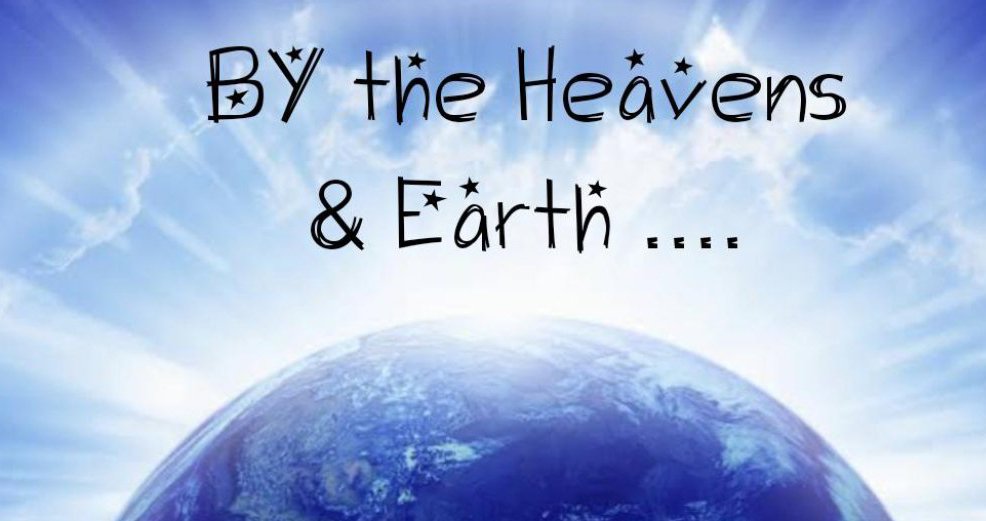

Man is an essence or the world or creation; the best on the earth and in the heavens. The human soul is one or the greatest mysteries of the universe. Its importance is so much so that Allah swears by it and by its Producer, both.
Allah asks us to reflect not only on our nafs (ourselves) but also on how remarkably it has been balanced and how amazing the One who balanced it is. What kind of attributes must the One Who balanced it have? Our conscience is something that makes us remember Allah and since He is the one that gave us our conscience we should realise that He is watching what we do with it. Allah is the One who programmed feelings like guilt, remorse, satisfaction and joy into us and watches how we handle ourselves.
Man is merely made up of two things, body and the soul. This heart is affected by two influences, one from the needs of the body and the other the soul. If man listens to the body too much the heart becomes hard as a consequence and if it listens to the soul excessively it does injustice to the body. These two influences are trying to win over the heart and assert it’s authority over it and its important for man to strike a balance between the two in this constant battle for the Nafs. This is how Alllah related so well previously that sun & moon, night & day, sky & earth are all opposite to each other yet they exhibit a perfect balance. Similarly if man balances his soul and body, will attain the real state of honor.
Apart from that Allah gave man such a body which by virtue of its erect stature, its hands and feet, and its brain was most appropriate for him to live as man in the world. He blessed him with the five senses to be means of getting knowledge for him. He endowed him with the faculties of thinking and reasoning, imagination, memory, discrimination, judgment, will-power and such other mental powers by virtue of which he is able to perform the functions fit for man in the world. So a perfectly balanced soul put in the balanced body Allah wanted man to ponder and act for the Afterlife!
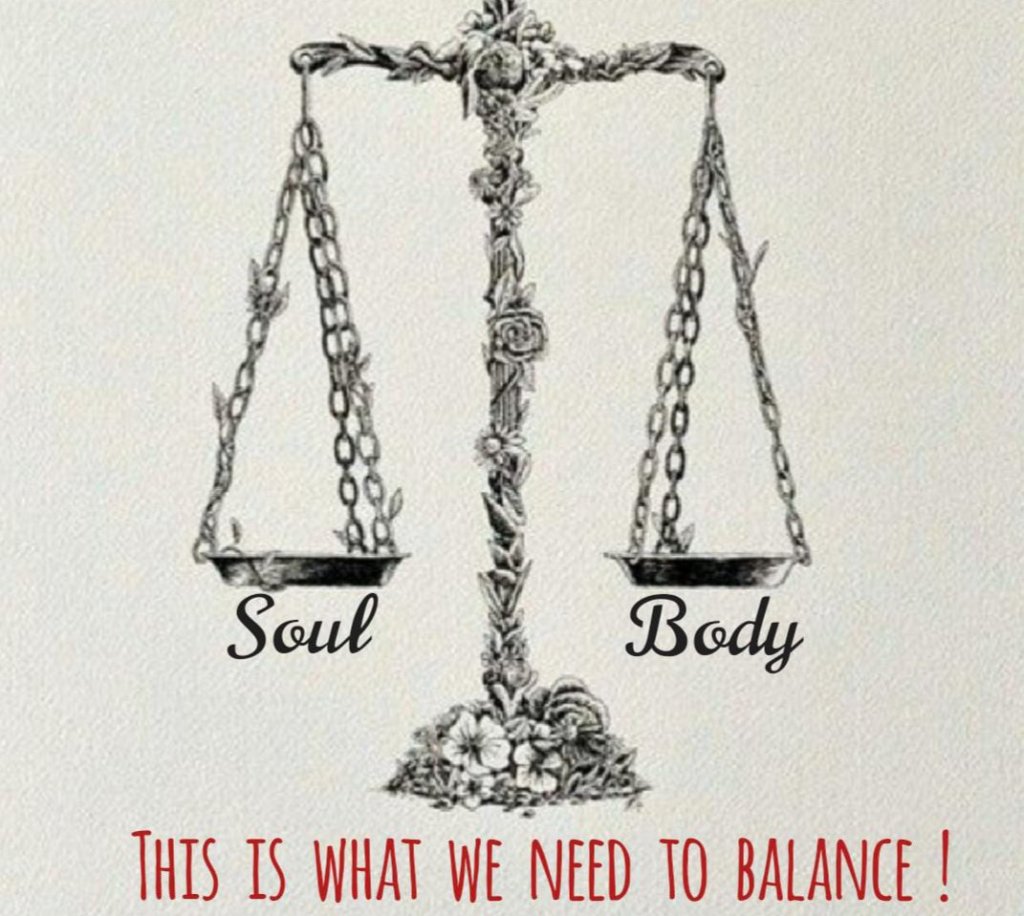

After the oaths taken now Allah says that He inspired the soul/man its own rebellion or wickedness (fujoor) and piety (taqwa). The word ilham is when there is something in your heart that feels more certain than fact, normally what we would call a gut feeling. Allah made the man thoroughly aware of the two states taqwa & fujoor. That the beauty lies in taqwa and the ugliness in fujoor.
Inspiring the human self with its wickedness and its piety has two meanings:
(1) That the Creator has placed in it tendencies to both good and evil, and this is the thing that every man feels in himself.
(2) That Allah has endowed every man’s unconscious mind with the concept that there is a moral good and there is a moral evil, that good morals and acts and evil morals and acts are not equal and alike; fujur (immorality) is an evil thing and taqwa (abstention from evils) a good thing.
These concepts are not new to man; he is conscious of these by nature, and the Creator has endowed him with the ability to distinguish between good and evil naturally. This same thing has been said in Surah AI-Balad V:10:
“And We showed him both the highways of good and evil.”
“We showed him the way, whether to be grateful or disbelieving”
Surah Ad-Dhar (V:3)

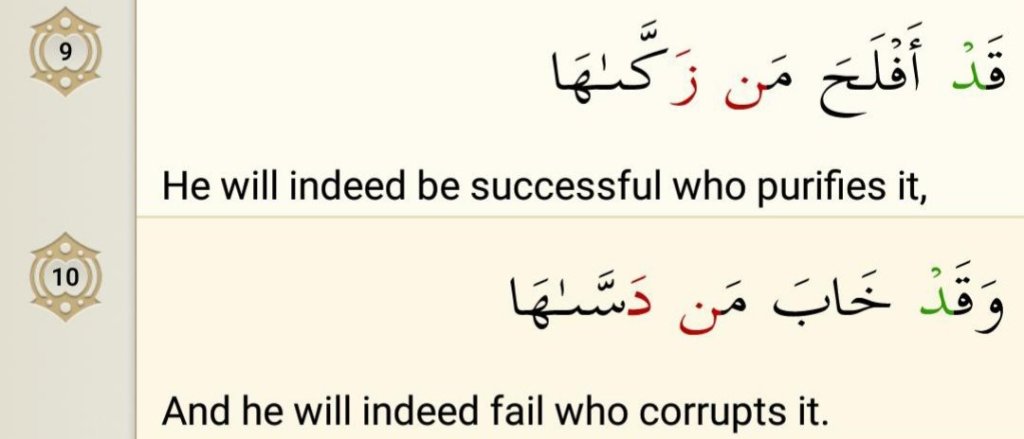
Tazkiya means to purify, develop and cultivate. Here it means the one who purifies his self of fujur (evil) and develops it to the level of taqwa and cultivates in it the good. Such a person will attain to eternal success. As against this the word dassaha has been used, which means to suppress, conceal, seduce and lead astray. Which means the one who suppresses the tendency in his self towards good instead of developing and cultivating it, who seduces it into doing evil, and makes fujur dominate over taqwa so as to cover it up completely like the dead body which is buried and covered with earth. And such a person will end up to be a failure. The one who completely and utterly disregarded his nafs by not listening to his inner voice and in doing so has set himself up for immense disappointment. This diseased nafs put himself in the dust because he did not care about his nafs and does not think anyone else is going to care either.
Just like the night and the day and the sun and the moon were created in balance so too was this nafs but this person has lost control. The parallel between the sun and the nafs drawn in this surah is that Allah gives the nafs bright ability to cleanse itself but it can still come to a point where it becomes covered with the darkness of sin and misguidance just like when the day ends and the night begins. However, even in the night the sun still benefits the moon by bringing out its light and in the same way a clean nafs benefits not just itself but others by letting its light reach others. So, even in the toughest time of fitna you will still benefit from a clean nafs because it will be like the bright moon that shines in the darkness. Also, remember that Allah allows the brightness of the sun to return every day and overcome the darkness and in the same way the nafs can repent and move back towards doing good. This is the parallel that is drawn between the beginning oaths and the trials of the nafs.
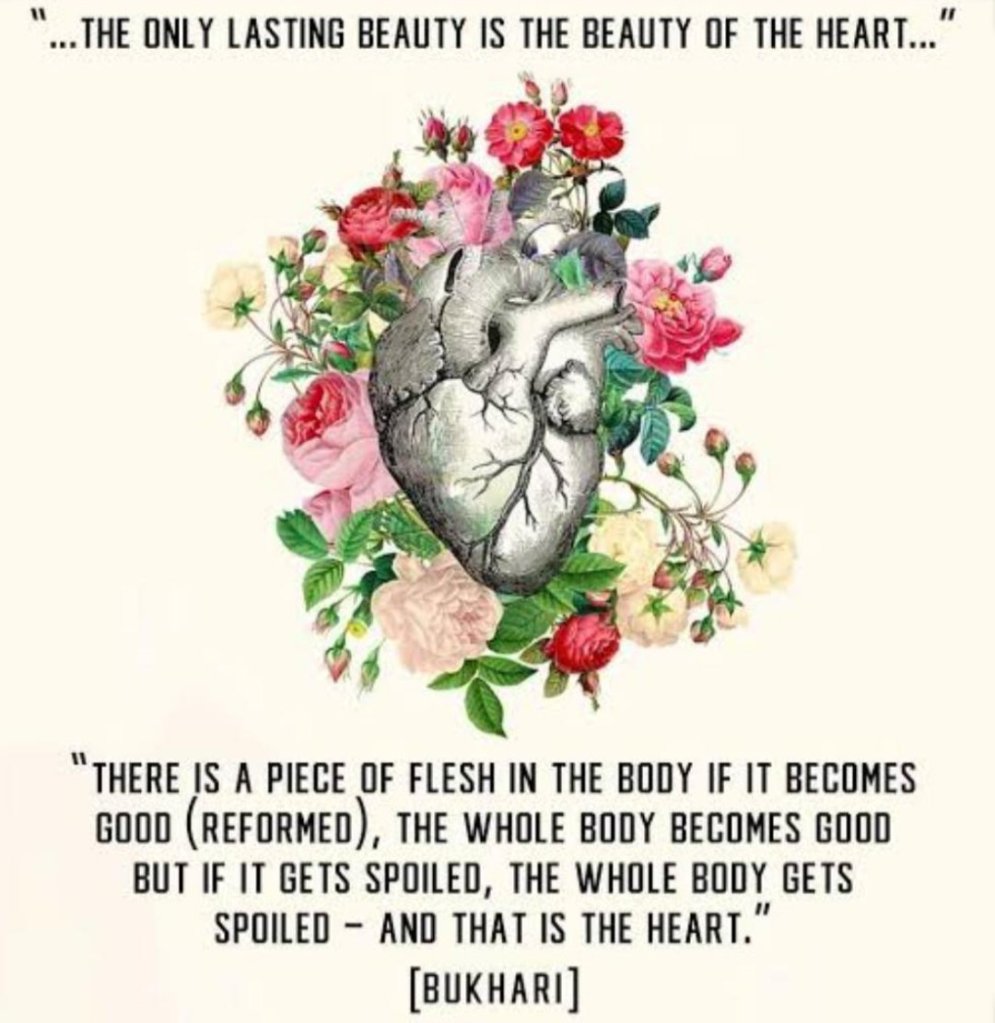
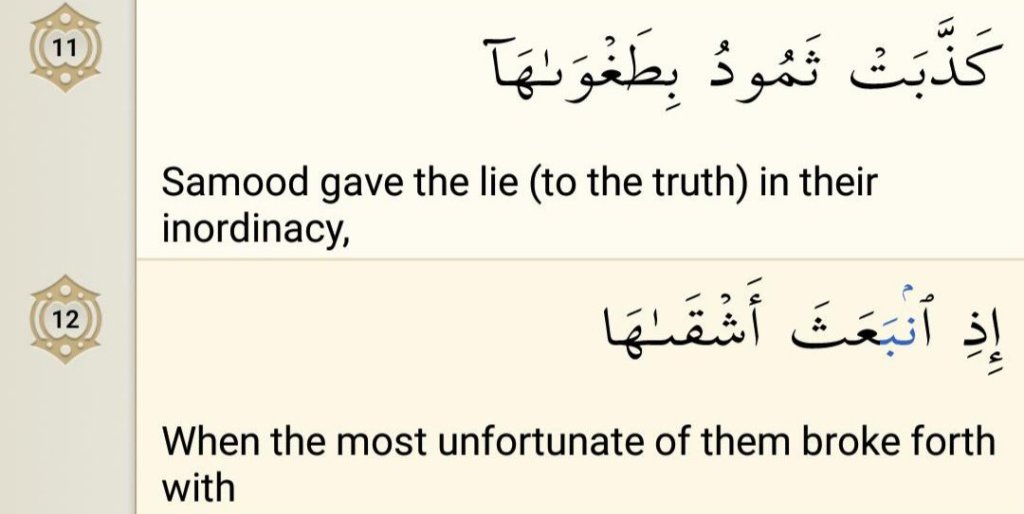
Now Allah shifts the subject to the past to stress on the fatal end of the wrongdoers. Following the previous awakening verses about the end of those who pollute their soul, in these upcoming verses one of the clear examples of these people, of the past, is referred to and the destiny of the Thamood is explained with some short, expressive, decisive sentences.
The people of Thamood rejected their prophet through their inordinate wrong doing!
They exceeded all the Divine bounds and disobeyed His Law.
The Thamood people, whose prophet was Salih a.s are the most ancient people to have lived in a zone between Hijaz and Sham (Syria). They lived comfortably and care-free on a fertile, level land in strong, splendid castles.
They not only showed ingratitude for the abundant blessings they had, but disobeyed their Lord by acting rebellious to the instruction of the Apostle Salih a.s and mocked His Sign, the she-camel. The people of Thamud had challenged Salih a.s to present a sign (a miracle) if he was truthful. Thereupon the Prophet presented a she-camel miraculously before them and warned them to the effect: “This is Allah’s she-camel. She will graze at will in the land. One day will be for her to drink and one day for you and your cattle. If you molest her, you will be punished with a wrath.” This proved to be a deterrent for some time. Then they appealed to their most wicked and rebellious chief to put an end to the she-camel, and he took up the responsibility and hamstrung her.
This conduct brought wrath of Allah to the people by means of a sudden, violent blast from heaven which was accompanied by an earthquake.
In northern Hijaz its historical ruins were still there which the people of Makkah passed by during their trade journeys to Syria, and the way this tribe has been frequently referred to in the pre-Islamic poetry shows that its destruction was a common subject of talk among the Arabs.
The term ashqa means ‘the most wretched’ among them, referring to the person who hamstrung the she-camel which was sent to them as a trial and whose murder was a sign of rebellion against their divine Prophet.
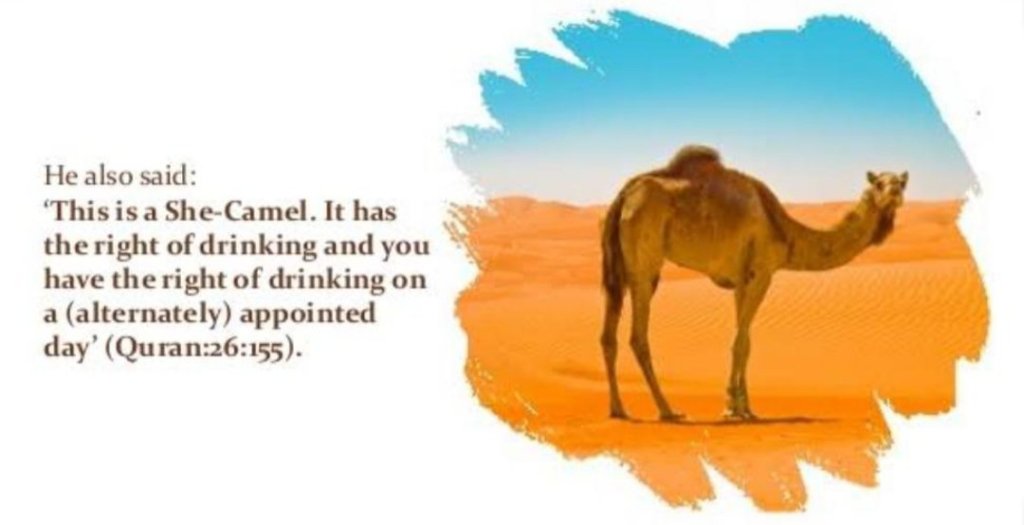
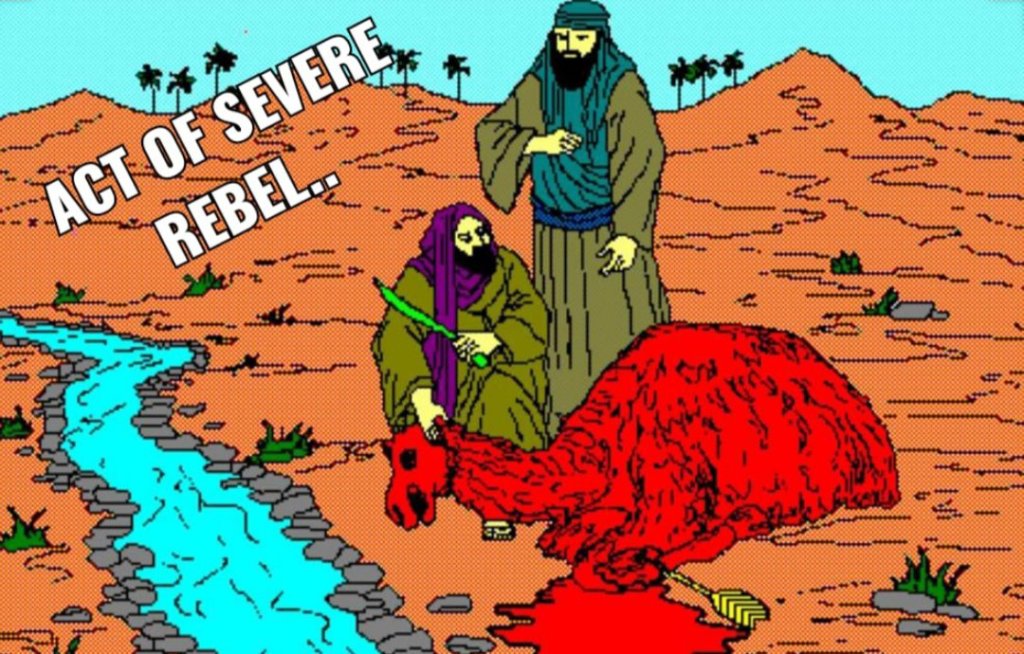
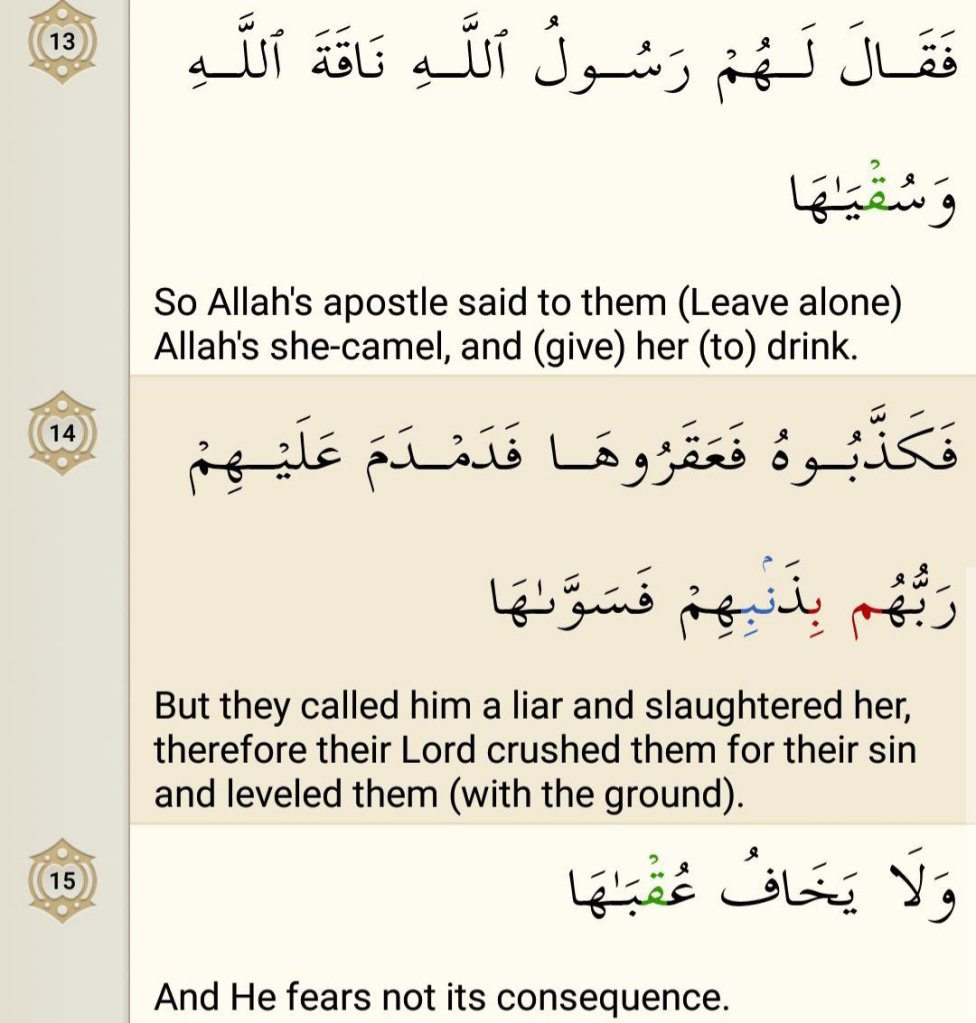
After the Prople of Thamud had killed the she-camel, they said to the Prophet Salih: “Bring the scourge with which you threatened us.” Prophet Salih said to them: “Well, you have only three more days to enjoy yourselves in your houses This is a limit that will not prove false. ”
Allah is not like the kings of the world and the rulers of governments, who, when they want to take some action against a people, are compelled to consider what will be the consequences of their action. Allah’s power is supreme. He had no apprehension that some supporting power of the Thamud would come out to avenge itself on Him.
Allah, the Almighty, the All-knowing, has created and can create at will, and there can be no question of any such apprehension in His case, that is why He does decisively what He pleases.
Transgressors and wrongdoers should be careful of their conditions, lest they will be involved in the wrath of Allah for their evil actions.Allah does not fear the consequence of destroying these wicked people. Only Allah can be free of concern and carefree about the consequence of His plans as no one can retaliate or question His authority.
